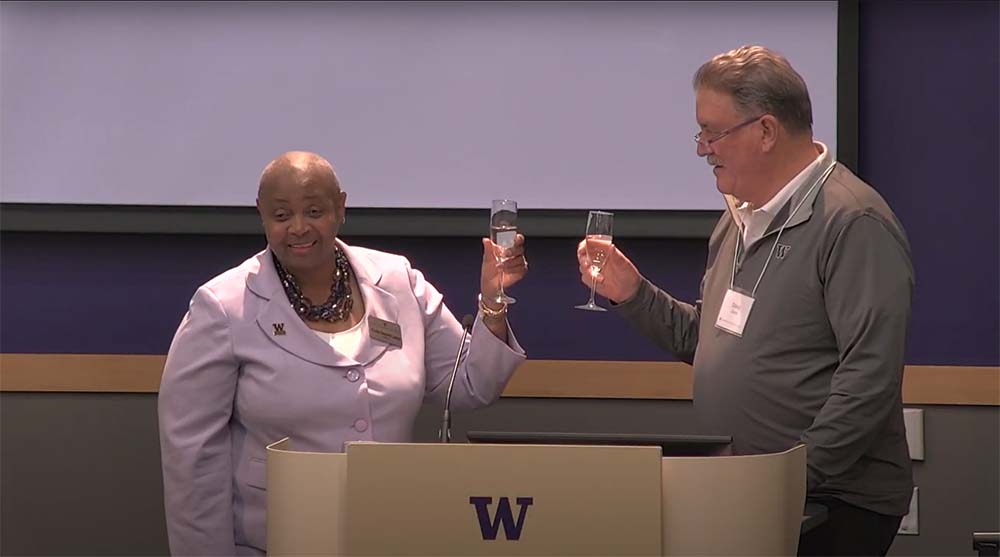UW Tacoma Will Be Best Regional Public University in Nation
Chancellor Sheila Edwards Lange shared her vision for the future of the UW Tacoma campus: more students, more academic programs, more collaboration, more equitable economic development.
UW Tacoma will be the best regional public university in the nation, said Chancellor Sheila Edwards Lange at a recent campus event. In the process, the campus will grow to serve 10,000 students.
“We are going to do that because we are focused on social and economic mobility for our students and their families,” said Lange, “and we will do it by partnering with our community to ensure equitable economic growth in our city and our region.”
Lange was the keynote speaker at “A Toast to Tacoma’s Future,” at which regional business and community leaders marked her one-year anniversary as Chancellor.
Grow to serve 10,000 students
During her remarks, Lange introduced her bold vision to grow enrollments. “We are about 5,000 students now. 60% are students of color, 56% are the first in their family to go to college, and over 75% get some kind of financial aid.”
“We definitely are serving students in the South Sound who might not otherwise get educational opportunity. We are going to grow by continuing to serve South Sound students, and we are going to supplement that with students from elsewhere in Washington and from the rest of the world. That kind of diversity in our classroom enriches the learning of our South Sound students.”
Lange said the target of serving 10,000 students is in the campus master plan. She noted that, in order to serve students from all over, UW Tacoma will need to add more residential space and establish a dining program. “Can you imagine? Seventeen- and eighteen-year-olds don’t want to cook for themselves!”
Equitable economic development
Lange also outlined a vision of equitable economic development for Tacoma and the South Sound. The Milgard School of Business will lead efforts to foster a cross-campus, community-linked interdisciplinary entrepreneurship culture. Faculty in all academic units will generate community-engaged research of national and international prominence. Academic planning will respond to industry need and workforce gaps. Working with the community, the campus will catalyze South-Sound-based start-ups and spin-outs using UW-developed technology.
“These goals are not pie-in-the-sky,” said Lange. “We are already within striking distance of the goal of being #1. For example, Washington Monthly ranks UW Tacoma #2 in the nation for social mobility in 2022.”
“None of this is going to happen overnight, particularly the growing of our enrollments to 10,000. It will take a lot of hard work. But I know we can do it. In fact, we have to do it. Our community demands that we do it. And it is consistent with our founding and our mission that we do this,” said Lange.
“Think of all the potential human capital in our community and in our state that is just waiting for opportunity,” said Lange. “All of those people whose lives and families could be transformed by a college education.”
“I’m one of them,” said Lange. “I was the first in my family to go to college. Because I went to college, all of my nieces and nephews went to college. I was just one person, but my example transformed the trajectory of my family.”
Milgard Hall
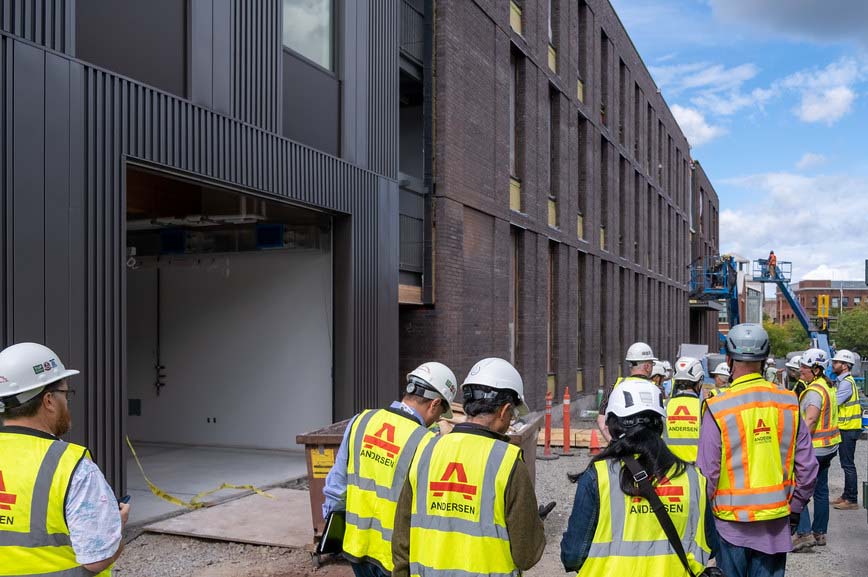
Lange gave attendees a preview of Milgard Hall, the campus’s newest academic building, expected to open in early 2023.
She noted that the building is a model of the innovation through which UW Tacoma will grow. It is built using cross-laminated timber, or CLT, and other sustainable technologies. It will house business, engineering and design-thinking programs under one roof, fostering collaboration, interdisciplinarity, and innovation.
And the opening of Milgard Hall will free up space elsewhere on campus, allowing for the growth of existing, and the addition of new, high-demand programs. This fall students are enrolling in a new bachelor of education, and undergraduate degrees in mechanical and civil engineering, and new master’s degrees in environmental science, information technology and a doctor of nursing practice degree are in the works.
“We are laying the foundation now for the UW Tacoma of 100 years from now,” said Lange. “At the end of the day, it has to be a shared vision.”
“Look, we are not unspectacular things.
We’ve come this far, survived this much.
What would happen if we decided to survive more?
To love harder?”
Read by Dr. Natalie Eschenbaum at Toast to Tacoma's Future
The event also served to introduce to those in attendance three new campus executives: Dr. Natalie Eschenbaum, dean of the School of Interdisciplinary Arts & Sciences; Dr. Elavie Ndura, vice chancellor of equity and inclusion; and Dr. Andrew Harris, executive vice chancellor of academic affairs.
Each of those campus leaders spoke briefly about their prior careers, what attracts them to UW Tacoma and what each envisions as their early focus for their units.
Dr. Natalie Eschenbaum
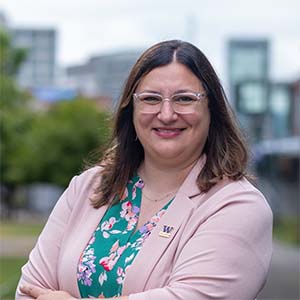
Eschenbaum drew a contrast between her birth city of Cambridge, England and Tacoma, noting that the former “very much shows a split between town and gown. We are the opposite. Tacoma integrates with its university campus. That was one of the big draws for me.”
Eschenbaum described another major asset that attracted her. “There are many, many schools of arts and sciences,” she said. “There are not many interdisciplinary schools of arts and sciences. We are the future of higher education, because creativity happens when different disciplines come together. Part of the vision moving forward is to keep hold of that interdisciplinarity and to grow in ways that make sense for the community we are serving.”
"The last two years have been difficult, for all of us," said Eschenbaum. "My immediate goal is to rebuild ourselves as the community we want to be going forward. My plan is to do that through a practice of generous thinking," a concept coined by Kathleen Fitzpatrick in her book of the same name.
“I am eager to lead the school through a lens of ‘generous thinking,’ ” said Eschenbaum, which is a concept coined by Kathleen Fitzpatrick in her book of the same name. “We are in this together. We are going to think generously, to listen together, to think together.”
Dr. Andrew Harris
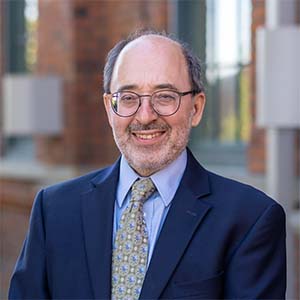
Harris is the first person in his family to receive a four-year college degree. “Like a lot of our students,” he said, “I came to college with a sense of purpose that had been handed to me by others. When I was there, I found my own. College changed me. Faculty, staff and peers modeled for me a fierce integrity in the pursuit of knowledge and wisdom to make the world better than I found it.”
He envisions that “with every student, we live out our promise of and commitment to social mobility, our promise and commitment to giving students the tools of equity, experience and critical thought with which to build strong and meaningful communities.”
“I was inspired to come here by the story of a place that was ‘magicked’ into existence by the community itself. Every place exists in a place, but most places are not called into being by that place, and that is unusual.”
Dr. Elavie Ndura
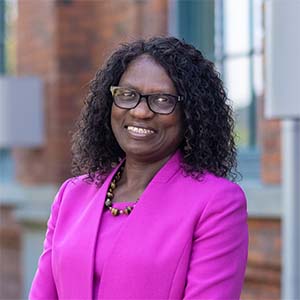
Ndura, who grew up in Burundi, Africa, noted that when she met with Chancellor Lange to discuss the vice chancellor for equity and inclusion role at UW Tacoma, “there was no avoiding the fact that I had just experienced the ideal chancellor with whom I would like to work to lead the quest for inclusive excellence.”
She decided to study multicultural education, bilingual education and curriculum and instruction “because I wanted to be the best I could in elevating the experience of every single student I was going to come across.”
“My vision, guided by the UW Diversity Blueprint,” said Ndura, “is to work with my team in the Office of Equity & Inclusion to create and sustain a UW Tacoma that is a safe and welcoming community, where each one of us feels empowered to bring our authentic, best self and realize our dreams.”
